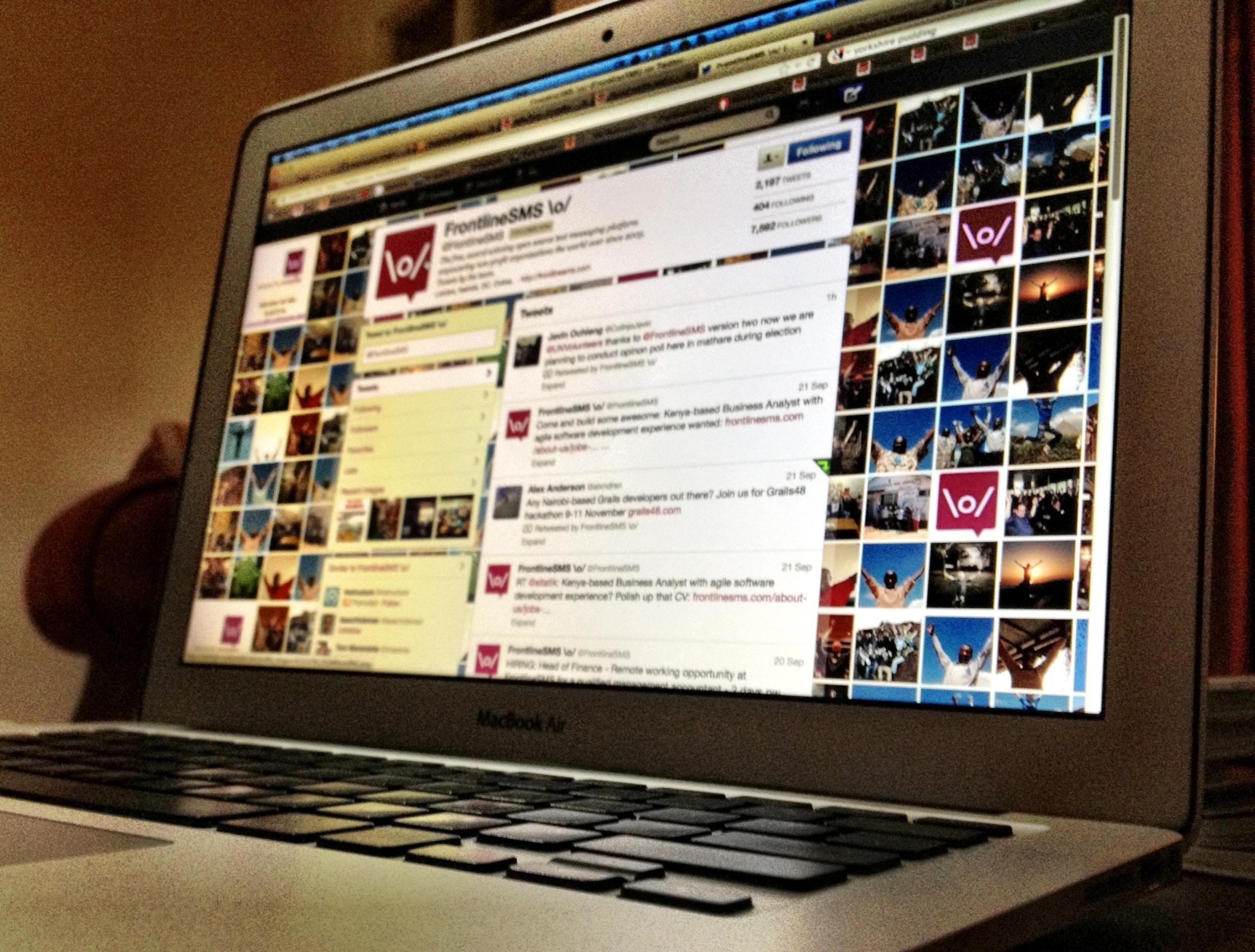It's Social Media Week this week, and in recognition of this and our seventh anniversary next month, we asked our Founder, Ken Banks, to reflect on the role that social media has played in the history and development of FrontlineSMS.

In a recent BBC Future article I wrote about the "democratisation of development". In it, I argued that the dual rise of the world wide web and mobile technology had opened up the opportunity for everyone to contribute to solving some of the world's bigger problems. Today, someone with an Internet connection and a software development kit can write a health-, agriculture- or human rights-focussed application and begin building a global user base within days, if not hours. To quote from my article, there are likely more people working on solving social and environmental problems in the world today than ever before in human history. Clearly this can't be a bad thing.
An Internet connection and a software development kit, along with the odd phone, cable and GSM modem - a luxury item back then - was exactly how FrontlineSMS got going in 2005. Slightly ahead of the curve, it took advantage of the increasing numbers of mobile phones in the hands of communities in the developing world and allowed non-profit organisations working with those people to better communicate with them. The idea and software development were carried out in relative isolation. It took the Internet and gradual rise of social media to truly open up the opportunity. Without either of those the project would not be where it is today. Without it, very many others wouldn't be where they are today, either.
When my IT career began in the 1980's, software was still mailed out on floppy disks, and software updates were few and far between. Clearly, anyone interested in software development had a clear problem of distribution, not to mention promotion. Back then I found out everything I needed to know in trade magazines. If FrontlineSMS had been born back in those days it would never have taken off. Without funds for promotion, and without any way of connecting easily with users, or getting the software to them, it would have gone nowhere. I often wonder how I'd have mailed floppy disks to users in remote Sierra Leone, or Indonesia, even if they had managed to hear about it and want a copy. The Internet changed all that. Today, the FrontlineSMS website is the equivalent of a double page spread in a glossy computing magazine, and the download button the equivalent of dropping floppy disks in the post. Not only are things much much quicker, they're as good as free, and the reach is enormous.
Social media has played a considerable role in the success of FrontlineSMS, too. The project never had a marketing and promotion budget, so in the early days it was all about maximising every free channel that was available. Blogging was the first. People were kept up-to-date with latest user statistics, case studies, conference talks, guest articles, grants and snippets of news. We pride ourselves in giving our users a voice and letting them tell the world how the software has impacted their work, and this strategy worked incredibly well. Comments were left on other blogs writing about technology and development, and often they linked back to FrontlineSMS articles and posts. It probably took a couple of years, but blogging eventually got us the early traction we needed.
To show how long FrontlineSMS has been around, Facebook wasn't really up to a huge amount back in 2005 (although it was clearly going places). As the user base grew, we took advantage of its increasing reach by cross-posting blog entries and setting up group pages. Facebook, as Twitter has done more recently, crucially helped take the project to a new audience. Whereas blogging had largely promoted it among the technology-for-development (ICT4D) community, Facebook allowed for more serendipitous connections to develop. One of those directly lead us to Wieden+Kennedy, a design agency who later worked on the first revamp of the FrontlineSMS website, and the development of the now infamous o/ logo. Since then, Facebook and Twitter have been crucial in helping us promote the use of the software, in sharing news, and creating buzz around new software releases and new grant funding.
At another level, social media has been central in allowing us to recruit volunteers and staff. Twitter now effectively acts as our "Volunteer, intern and vacancy" bulletin board, with increasing numbers of staff coming through connections first made on Twitter. When Laura Walker Hudson joined us a couple of years ago a tweet was not only the catalyst, but the very fact we were following each other signified, in my mind, a solid long-standing interest in who we were and what we were trying to do.
Without the world wide web, and the now ubiquitous social media platforms that sit on top of it, it's hard to see how FrontlineSMS would have made any ground at all. As we hear all too often, ideas are one thing but execution is another. Execution, however, is much harder if - armed with that great idea - you're not able to tell people about it. In Social Media Week we, at FrontlineSMS, acknowledge the role it has played in our own story and, along with our countless thousands of users around the world, say thank you for all the good things it has helped us and our dedicated community make possible.



